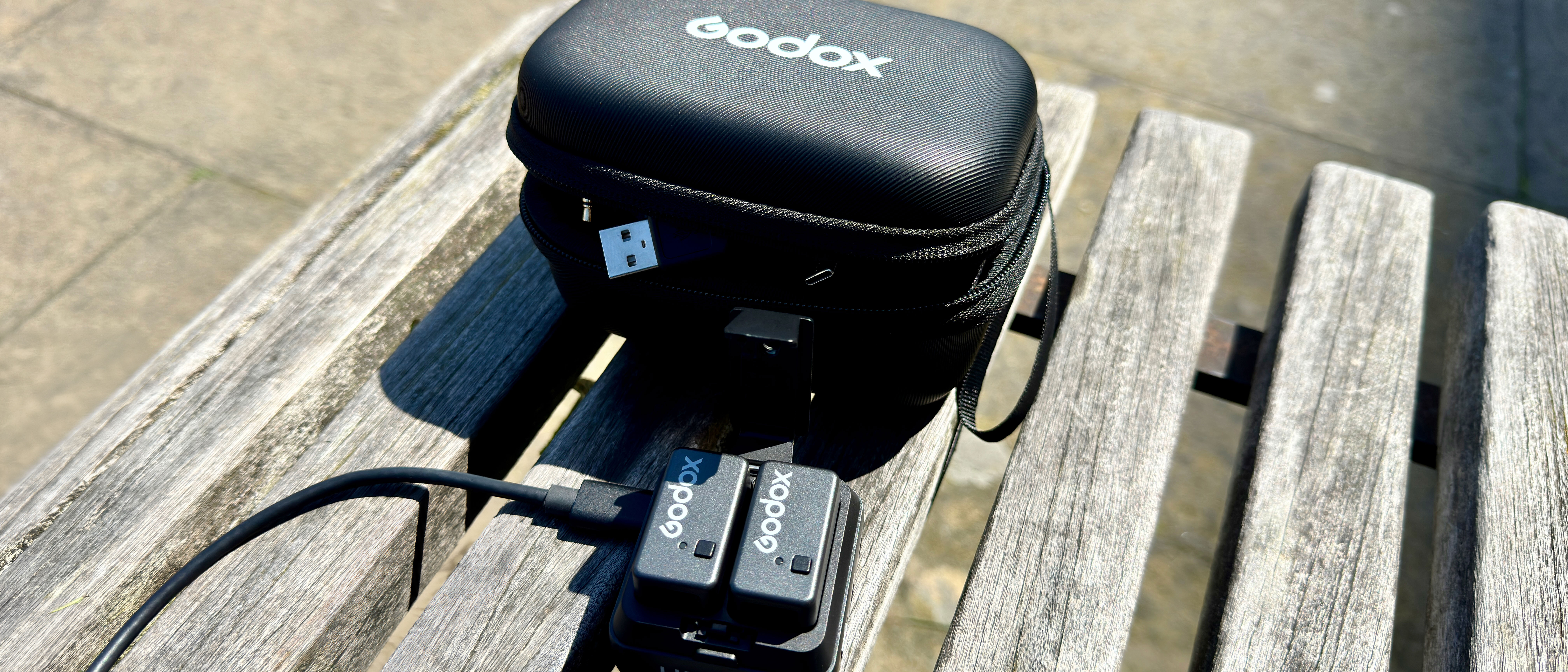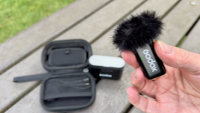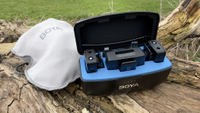Digital Camera World Verdict
The Godox Magic XT1’s main talking point is its innovative design, with the receiver acting as a dock and charger for the two wireless transmitters. However this marketing ‘sleight of hand’ shouldn’t make us overlook even more useful features such as the kit’s effective noise reduction and a rich full sound captured by the kit’s 48kHz/24bit Hi-Res audio technology. As well as these impressive design features and excellent audio performance the kit won’t break your budget at around $100.
Pros
- +
Receiver stores and charges transmitters
- +
Long transmission range
- +
24-bit audio
- +
Affordable
- +
Effective noise reduction
Cons
- -
Magnetic clips can be fiddly
- -
Receiver attaches via cable, not plug-in connector
Why you can trust Digital Camera World
Godox has been designing and manufacturing lighting and audio equipment for over two decades so it’s no surprise that you’ll find many Godox product reviews on this site. Indeed I’ve tested and reviewed four Godox mics within the last year of writing this, which is an indication of how prolific the company is - the most recent release was just a few weeks ago with the Godox WES2. If you are shopping around for a new microphone then you might also find our best lavalier mic buying guide of interest.
So do we need yet another wireless mic kit from Godox? Well, the Godox Magic X1 has a unique trick up its sleeve in relation to its design. But will this innovation have you under its spell or is it just smoke and mirrors? Read on to find out…
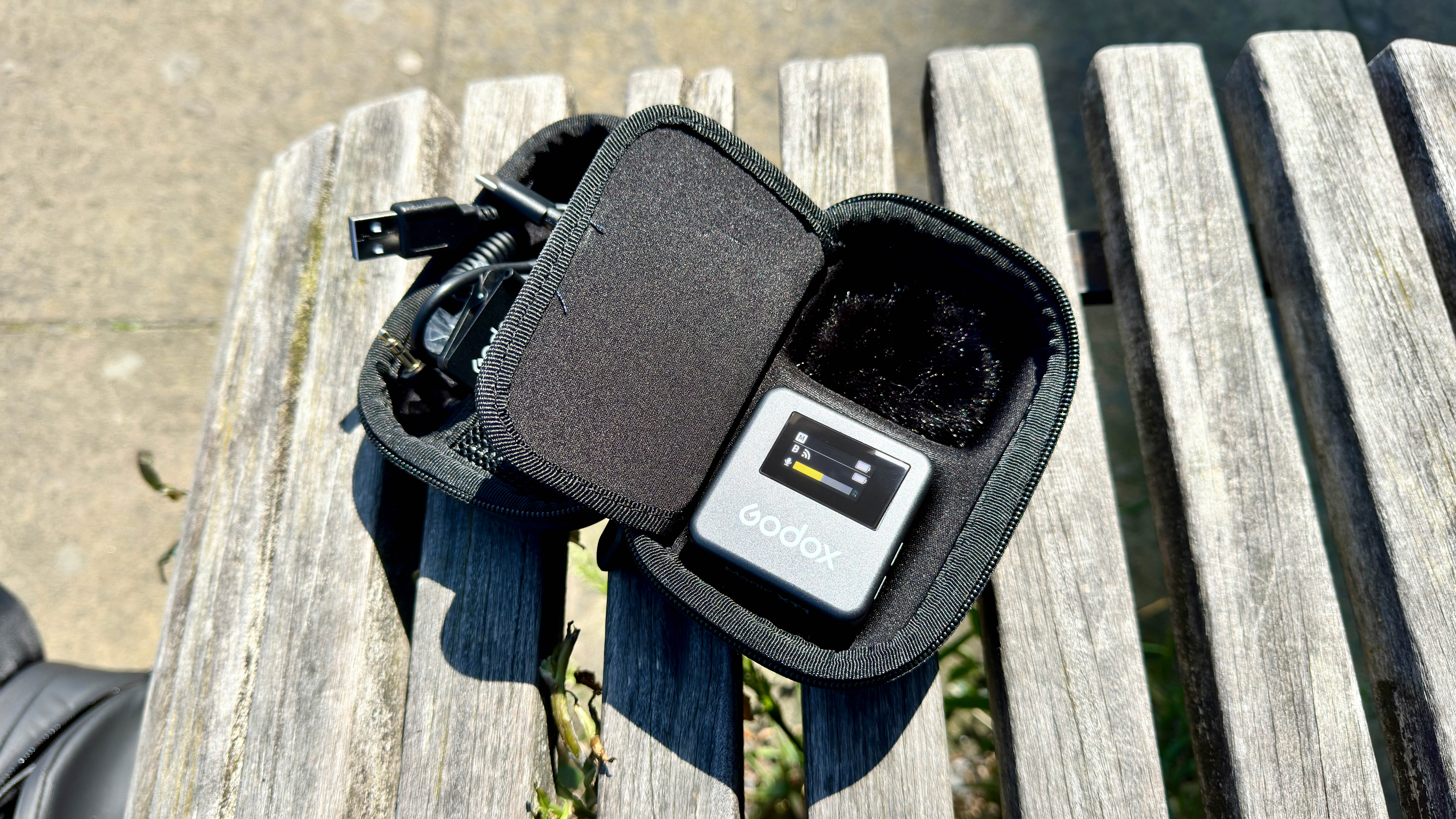
Godox Magic XT1: Specifications
| Sampling Rate | 48kHz/24bit |
| Max SPL | 115dB |
| Pick-up Pattern | Omnidirectional |
| Transmission Type | 2.4GHz Frequency hopping system |
| Dynamic Range | 70 dB |
| Battery Life | 8 hours approximately |
| Max Distance | 200m (with line of sight) |
| Onboard recording | No |
| Dimensions | 0.66 x 0.35 x 0.25 in |
| Net Weight | 8g |
| Reception Type | 2.4GHz Frequency hopping system |
| Max Distance | 200m (with line of sight) |
| Screen Type | Colour OLED |
| Battery Life | 16 hours |
| Dimensions | 0.94 x 0.94 x 0.69 in |
| Net Weight | 50g |
Godox Magic XT1: Design & Handling
As with most wireless mic kits the Godox Magic XT1 ships with two transmitters that attach (via clips or magnets) to you and an interviewee’s clothing. The transmitters broadcast your voice to a receiver which is plugged in via a cable to your smartphone or camera. So far so typical. However, the Magic X1 kit has an innovative design feature that I’ve not encountered before in a wireless kit. Most wireless mic kits ship with a plastic case or dock that enables you to charge the transmitters and receiver simultaneously. This charging case makes sure that both equally charged transmitters perform for the same length of time (so that you don’t lose the subject’s voice while they are being interviewed - or vice versa).
The Godox Magic X1 on the other hand doesn’t need a charging box for the transmitters and receiver. Instead, its receiver doubles up as both a dock and charger for the two transmitter mics while they are nestled inside it! This gives the Magic XT1 a very compact footprint which should help it appeal to mobile videographers who like to travel light with a small kit bag. It’s such a unique design feature that you’ll want to show it off to colleagues.
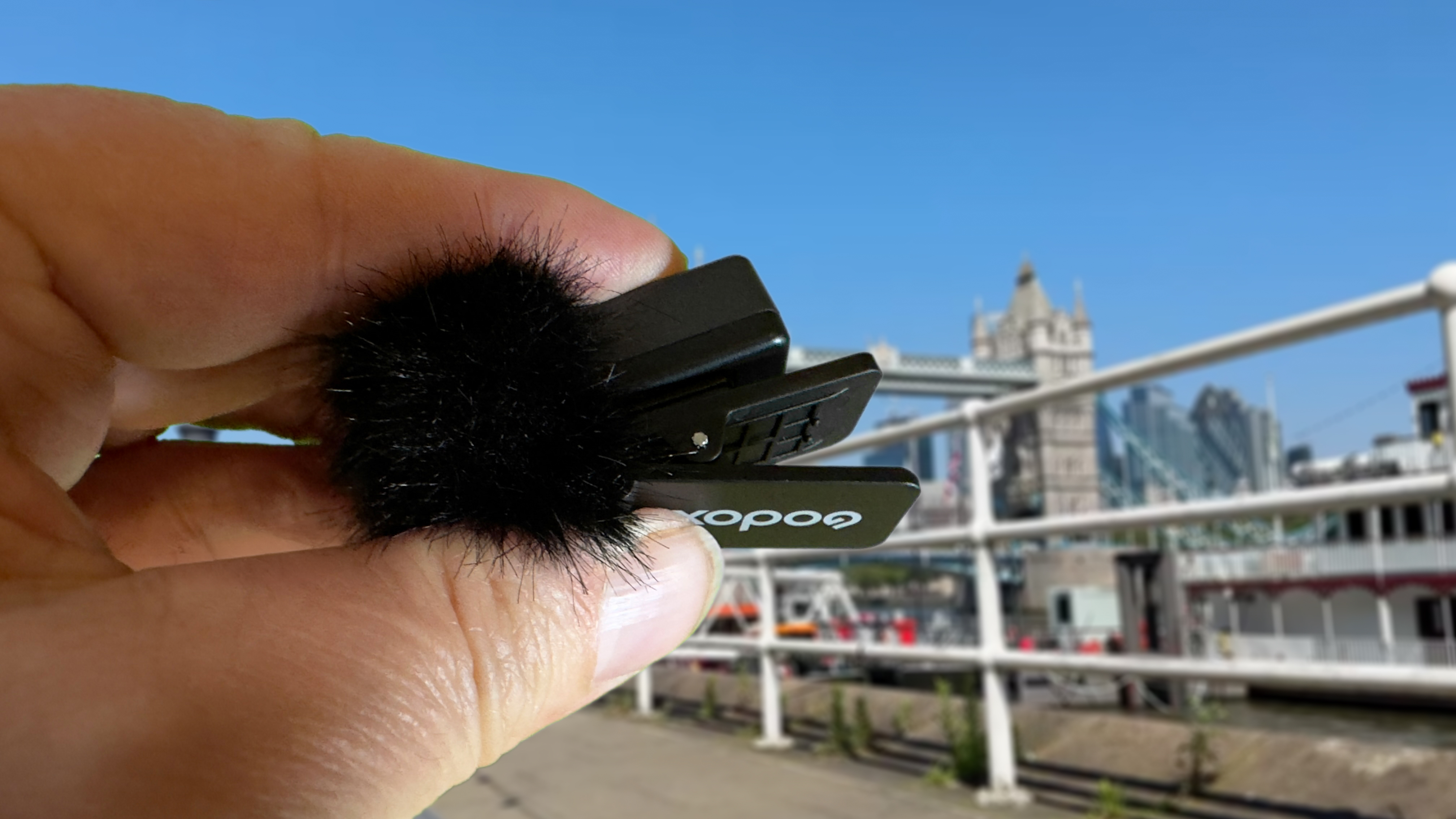
The Magic X1 kit also ships with a branded zippable carry case that’s the same size and shape as the cases that ship with the Godox WES2 and the Godox WEC. The key difference here is that the Magic X1’s case has an orange tag bearing a Magic X1 label, so you can easily identify the Magic X1 if you have other Godox cases on your shelf. So despite the smaller footprint achieved by docking the mics into the receiver you still need to transport the Magic X1 kit and its accessories in a standard-size Godox carry case.
When filming an interview the Magic X1 offers you a variety of ways to mic up your subject. At the rear of each tiny rectangular transmitter is a small magnet (branded with a ‘G’). You can detach the magnet and then place it behind your subject’s shirt or lapel. The mic will then clip onto the subject via the magnet. If you want to mic up an interviewee without fumbling around inside their shirt then you can attach the mic to the supplied magnetic clip and snap the clip onto their lapel. The magnets are very small and you run the risk of dropping them on location when removing them from the subject. The magnets are also very strong, so you need long nails to prise them from the back of the transmitter mic. If you do lose a magnet on a shoot, the kit ships with a couple of spares which is a welcome (and useful) touch.
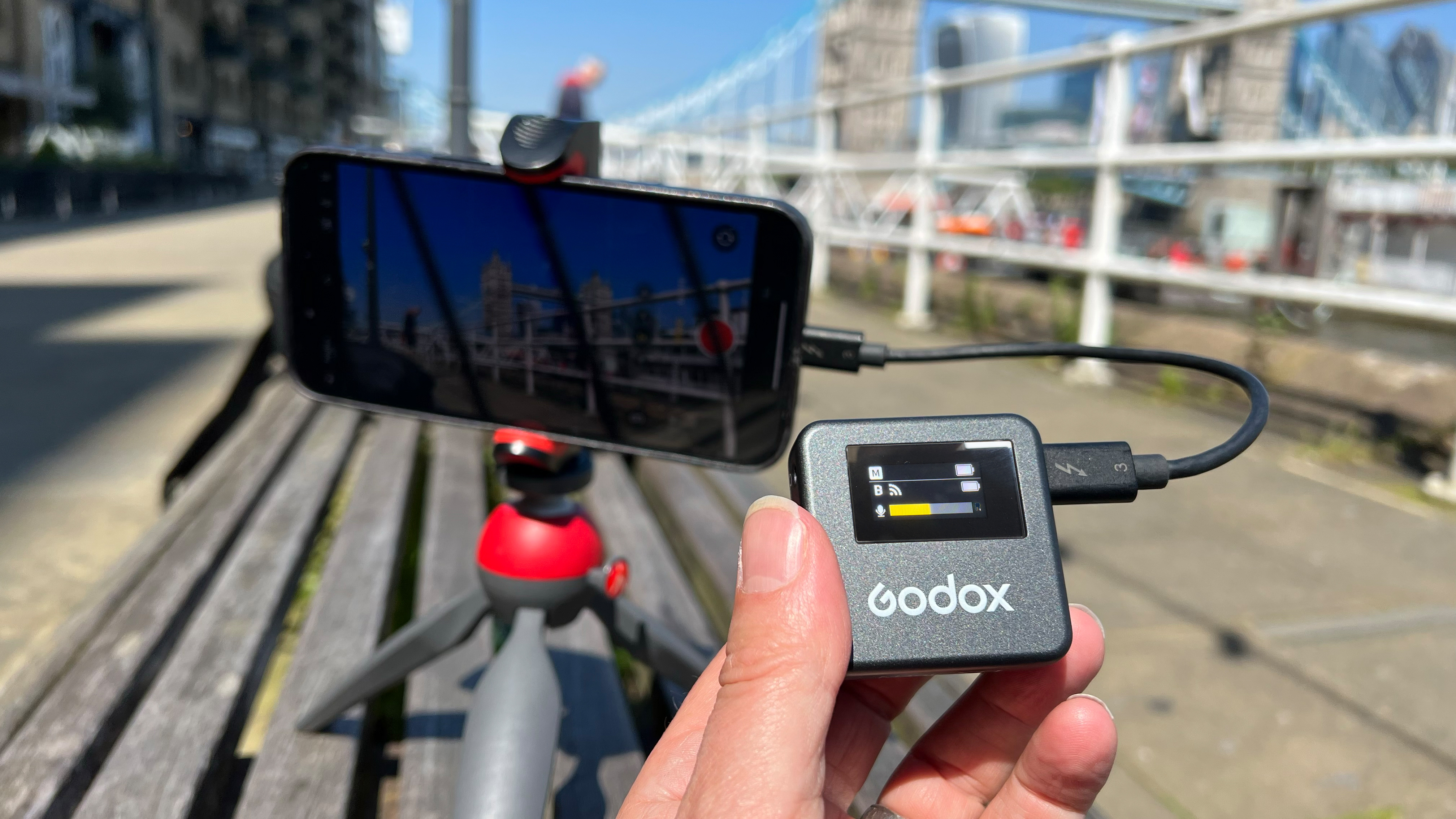
As well as being a dock and charger for the transmitters, the palm-sized receiver has a touchscreen that’s large enough to swipe and tap to access various menu items. This color screen enables you to adjusts the input levels of the A and B mics as well as trigger noise reduction or activate a low-cut filter to reduce the rumble of wind noise. You can also choose a safety track that causes one of the A/B channels to record at -6B which should reduce the chance of audio clipping. Thanks to the kit’s 48kHz/24bit pedigree the sound it records is excellent and you have more data to work with when tweaking audio in post.
The receiver can be docked onto a mirrorless camera’s shoe mount and attached to the camera via a supplied 3.5mm TRS-TRS cable. There’s also a USB-C slot to attach the receiver to a smartphone (though I had to supply my own USB-C to USB-C cable to connect the receiver to my iPhone 15 Pro Max.)
Godox Magic XT1: Performance
To test the Godox Magic X1 I headed to London’s South Bank to record a travelog-style video where I talked to camera in front of various landmarks (see supporting video). I decided to shoot on my iPhone 15 Pro Max as I love the quality of the clips that it records and it makes me look like a tourist (rather than a pro) so I don’t get moved on by the hi-viz jacket-wearing security personnel who prowl around that popular part of the city. A DSLR on a tripod sometimes gets me noticed and questioned whereas no one bats an eyelid at an iPhone on a mini-tripod.
The transmitter mic has a mini magnet already attached to it. If you attach the existing transmitter magnet to the supplied magnetic plastic clip then the additional width of the transmitter's magnet can cause the clip to fly off. Once I’d worked this out I detached the little magnet from the transmitter and then attached the plastic clip (via its own magnet) to the transmitter. This enabled me to securely clip the transmitter to my lapel. I filmed in an open location so there was some wind present. The supplied windshield slipped onto the transmitter easily and securely so no wind noise was present in my recording.
As there was an electric lawn mower at work near my location I tapped the noise reduction button on the transmitter. The machine’s noise dipped effectively and my voice sounded only marginally thinner than it did without noise reduction being applied, making this mic’s NR feature more effective than mics such as the Godox WES2 kit which produced a thinner and more warbly sound when the NR feature was activated. When I moved closer to groups of chatting tourists their voices did break through the noise reduction shield a little, but that’s to be expected as their vocal frequencies were similar to mine. You can hear the Noise Reduction feature’s effectiveness for yourself in our supporting video.
I also conducted the obligatory wireless mic distance test by leaving the iPhone on a tripod and walking away from it. The transmitter kept my voice sounding loud and clear and there was no signal drop out when I turned away from the camera (and the mic lost line of sight with the receiver). Given that I was filming in a busy city location I didn’t walk too far from my expensive iPhone, though as you’ll see from the supporting video I was far enough way that you could barely see my lips move - which should be far enough for most video makers needs!

Godox Magic XT1: Verdict
Although the Magic X1’s transmitters and receivers dock together as a single compact unit you still need to carry them in the supplied Godox branded carry case as it’s full of essential supporting accessories such as windshields, magnetic clips, and cables, so despite its innovative compact design the Magic X1 still takes up as much space in your kit bag as other Godox mic kits.
Design innovations aside the Magic X1 performs well and offers a range of ways to quickly attach the transmitters to your subject, which should make it appeal in particular to documentary filmmakers who like to work quickly. It will also suit the needs of typical bloggers who like to have their branded mics subtly visible to viewers.
| Features | 48kHz/24bit Hi-Res audio technology makes your voice sound great and the 2.4GHz Frequency hopping system helps avoid drop out. | ★★★★★ |
| Design | The receiver’s ability to store and charge the transmitters is an innovative design, but it still needs to be carried in a standard sized Godox case. | ★★★★☆ |
| Performance | Your voice sounds great even with noise reduction technoogy applied to it Score. | ★★★★☆ |
| Value | As it features great quality audio and has an interactive touchscreen this kit is a bargain! | ★★★★★ |
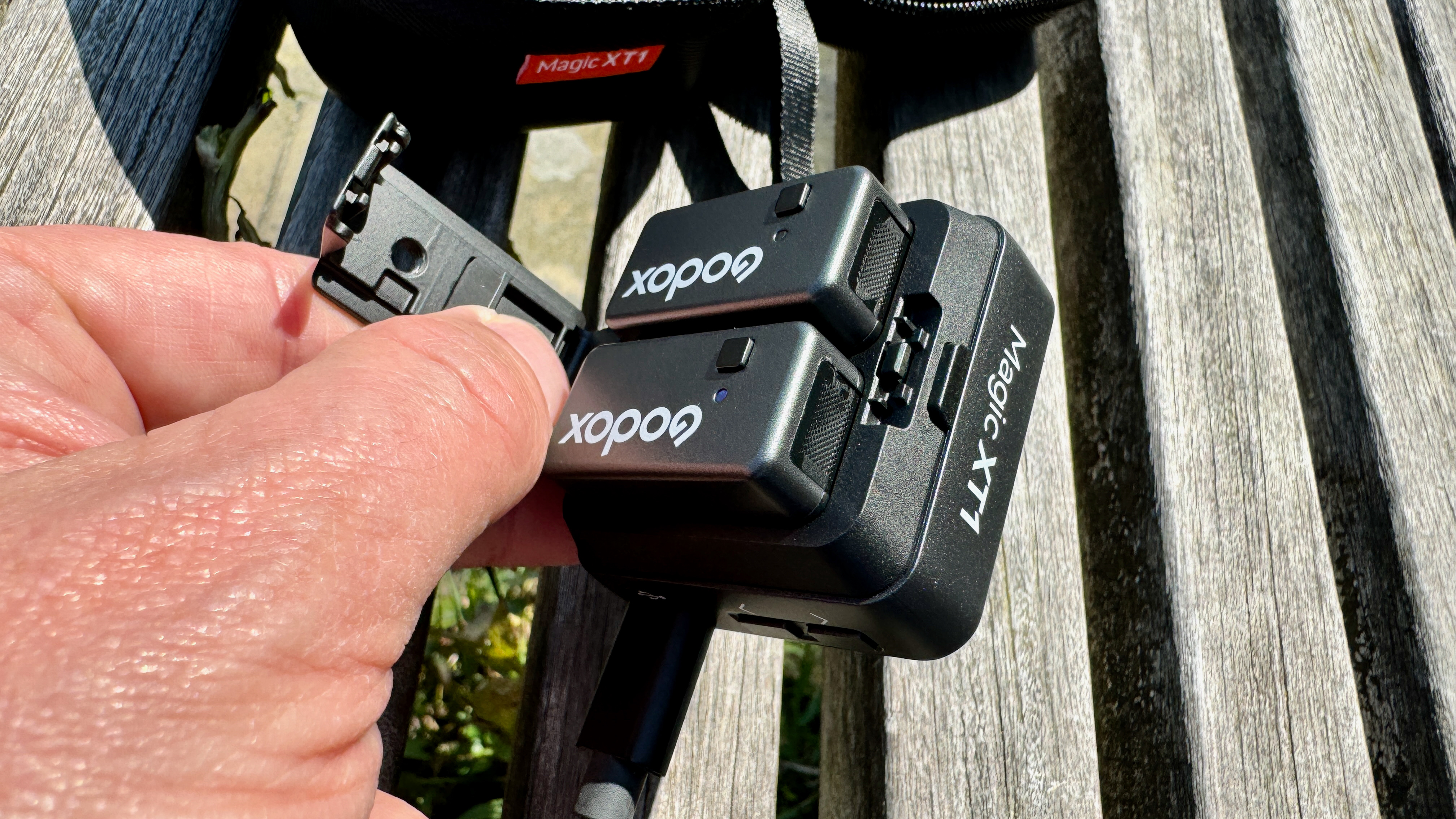
✅ Buy this...
- Because it gives you effective noise reduction.
- Because it goes the distance without dropping out.
🚫 Don't buy this...
- If you need the safety net of onboard recording.
- If you prefer a transmitter with a plug socket rather than dangling cables.
Alternatives
Godox WES2 Kit2
This excellent ‘plug-and-play’ mic kit instantly improves your smartphone’s audio recordings (though make sure that you buy the correct iPhone-compatible model - the WES2 has a USB-C connector on its receiver while the WES1 has a lighting cable connector). We were impressed by its ability to ‘go the distance’ with the minimum of signal dropout. Although the WES2 is a budget mic it is worth investing in due to the high-quality sound that it captures - through its built-in noise reduction produces a thinner and sharper voice recording than NR-filtered audio from the Magic XT1.
Boyamic
Released in early 2024, the Boyamic is an iPhone/smartphone-friendly wireless mic kit. Unlike the Godox Magic XT1’s cable-connected receiver the Boyamic ships with two adaptors that enable you to plug its receiver directly into any smartphone/iPhone model. It also has the bonus of onboard recording (to repair holes in the fusion caused by signal drop-out), which makes the Boyamic more expensive than the Godox Magic XT1.
George has been freelancing as a photo fixing and creative tutorial writer since 2002, working for award winning titles such as Digital Camera, PhotoPlus, N-Photo and Practical Photoshop. He's expert in communicating the ins and outs of Photoshop and Lightroom, as well as producing video production tutorials on Final Cut Pro and iMovie for magazines such as iCreate and Mac Format. He also produces regular and exclusive Photoshop CC tutorials for his YouTube channel.
